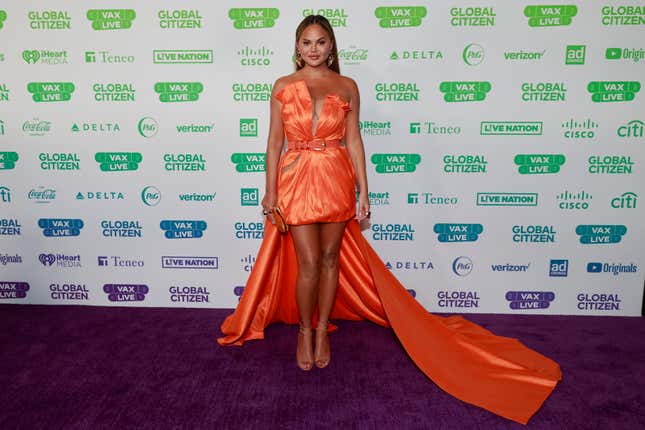The Rise and Fall of Chrissy Teigen, Twitter's Biggest (Unwitting) Troll
Twitter can make a star out of anybody, but the fall from grace can be just as swift
Celebrities

In the early 2010s, Chrissy Teigen was a model, best known for her food blog, Cravings, and for being “good” on Twitter. A 2014 Esquire profile of Teigen written by A.J. Jacobs now reads as a breathless acknowledgment of a woman’s ability to be both funny and conventionally attractive—the sort of writing that characterized so many profiles of women like Teigen in the early 2010s, when it was seemingly unthinkable that a woman could have more to her than her looks. Teigen’s draw then was her Twitter, which has always been candid, unfiltered, and lively—often to her benefit, but more recently, to her detriment. As Teigen gazes into the chasm of cancelation, it is clear that what made her a star in the first place—particularly her charm and her lack of a filter—are the root of her undoing.
As Constance Grady at Vox points out, Teigen’s rise on the platform was due in part to her relatability—the uncanny projection that even though she is famous, beautiful, and rich, she is still just one of us. Teigen’s popularity was the natural antidote to the traditional model of Hollywood starlet that presents as polished, tame, and armed with a purse full of press-friendly, neutral sound bites that revealed nothing. Even Teigen’s full-throated embrace of Twitter—a platform for peasants—was part of this shtick. While Jennifer Lawrence was tripping up the stairs at the 2013 Academy Awards, embodying what Anne Helen Peterson called the “cool girl,” Teigen was doing interviews with the lad mags like GQ and Esquire, firing off quips about her “little half-Asian butt” and becoming “teary-eyed” at the sight of a Wheat Thin. These quotes, and many others that Teigen has given to the press over the long course of her career, were merely dress rehearsals for her main stage performance on Twitter, which is where she carved a sizable niche for herself as a woman who is unafraid to pull back the curtain on celebrity.
What the lad mag interviews of the early 2010s were really picking up on was not Teigen’s relatability per se, but the fact that she was so willing to make herself accessible for the cis men who would otherwise be intimidated by someone so smokin’ hot. But by crafting her public persona as the Sports Illustrated swimsuit issue model who talks about eating American cheese and strategically overshares in interviews, she became an attainable fantasy: a woman who is beautiful and approachable, even if the latter is a performance.
At the beginning of Teigen’s Twitter career, her strategy seemed to be picking fights with public figures, firing off joke tweets and occasionally getting a response. For normal people who tend towards this sort of behavior online, getting a response from the person in question is an excellent way to acquire a little clout by association, a possible path to social media fame. The key difference is that Teigen is famous enough that when the public figures respond to her, it makes news. When Teigen offered unsolicited advice to Amanda Bynes’s fans in 2013, much to the displeasure of Bynes herself, Us Weekly picked up the beef and framed it as a “feud.” Teigen has participated in enough skirmishes—with public figures and random internet trolls alike—that Cosmopolitan was able to find 50 examples of her most searing rebukes, packaged with the 2010’s “yas, kween” mentality. Teigen built up her personal brand recognition by punching up, down, sideways—whatever got traction.
-

-

-

-

-

-

-

-

-

-

-

-

-

-

-

-

-

-

-

-

-

-

-

-

-

-

-

-

-

-

-

-

-

-

-

-

-

-

-

-








































